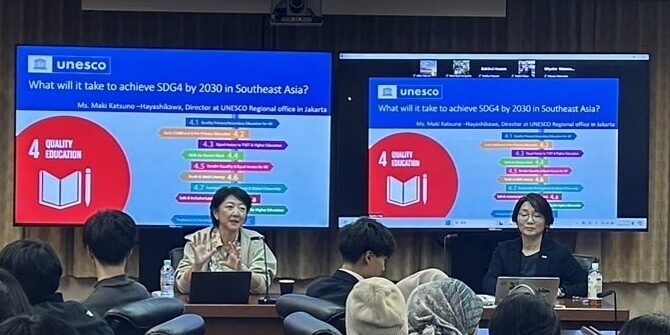Field Study in Washington, D.C. (Jingyuan MA)
From 9 March, 2015 to 20 March 2015, I participated in the 59th annual conference of the Comparative and International Education Society (CIES 2015), and the field study conducted by...
Graduate School of International Cooperation Studies (GSICS), Kobe University


On November 18, 2024, the Graduate School of International Cooperation Studies at Kobe University hosted the Campus Asia Risk Management Seminar. The event welcomed Ms. Maki Hayashikawa (Katsuno), Director at the UNESCO Regional Office in Jakarta, as a guest speaker. The UNESCO Jakarta Regional Office oversees initiatives in Brunei, Malaysia, Indonesia, the Philippines, and Timor-Leste, addressing diverse fields, including education, science, culture, communication and information, and social and human sciences.
The seminar centered on the theme, “What will it take to achieve SDG4 by 2030 in Southeast Asia?” Drawing on her extensive experience as the Director of the UNESCO Regional Office in Jakarta, Ms. Hayashikawa shared insights into the current state of education in Southeast Asia. She addressed the region’s challenges, strategies to overcome them, and the key activities led by the Jakarta Regional Office.
Ms. Hayashikawa began by highlighting the declining government spending on education in Southeast Asia. She underscored risks posed by insufficient education data, which hamper the identification and resolution of critical issues. She then outlined four major challenges facing education in the region: (1) Learning Poverty, (2) Digital Divide, (3) Climate Vulnerability, and (4) Limited Funding. As strategies for overcoming these challenges, she emphasized the importance of establishing mechanisms for cooperation at various levels. Ms. Hayashikawa also elaborated on discussions from the 6th Asia-Pacific Meeting on Education 2030 (APMED 6) held in Thailand in September 2024. She explained the following points in theAPMED 6 Outline Document: priority actions to unlock the transformative power of education; transformative actions to accelerate progress towards SDG4; investing more, more equitably, and more efficiently in education. Finally, Ms. Hayashikawa introduced activities by the Jakarta Regional Office, including TSUNAMI UNITED, an initiative aimed at equipping youth with knowledge about tsunami hazards, awareness, and preparedness, fostering a network of learning and collaboration among high school students in the Indian Ocean; creative youth at Indonesian heritage sites, a program promoting youth entrepreneurship and raise awareness about cultural and natural heritage by linking local communities’ livelihoods with the heritage sites; and UNESCO Youth as Researchers and Tanoto Student Research Awards (YAR-TSRA), a capacity-building program enhancing the skills of Indonesian university students in social research.
 Following the lecture, a lively Q&A session was held with students. Both Ms. Hayashikawa and Ms. Mioko Saito, who have extensive experience at UNESCO IIEP, provided thoughtful and detailed responses to many students’ questions.
Following the lecture, a lively Q&A session was held with students. Both Ms. Hayashikawa and Ms. Mioko Saito, who have extensive experience at UNESCO IIEP, provided thoughtful and detailed responses to many students’ questions.
Finally, we extend our heartfelt gratitude to Ms. Hayashikawa for her inspiring lecture, Ms. Saito for her kindly addressing the students’ questions, and Professor Keiichi Ogawa for providing this invaluable opportunity.
Authored by Noa Yokogawa (Master’s student)